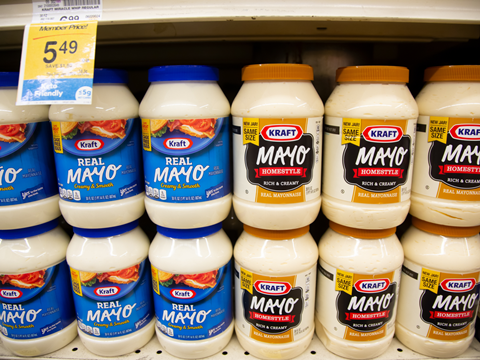
Plastipak and Kraft Heinz have announced their intent to transition Kraft Real Mayo and Miracle Whip containers into a 100% rPET design in a bid to eliminate around 14 million pounds of virgin plastic and reduce carbon emissions.
Claiming to ‘recognize the infinite possibilities of plastic’, the company shares its ambition to work with its customers to understand their needs. The transition into 100% food-grade rPET in the United States is expected to help Kraft Heinz cut 20% of virgin plastic from its global packaging portfolio by 2030.
“We are investing in innovative technologies and partnerships that are critical to helping us redesign packaging, eliminate unnecessary plastic, increase our use of recycled content, and influence the adoption of reuse models,” said Rashida La Lande, General Counsel & Chief Legal and Corporate Affairs officer at Kraft Heinz. “This is one more way we’re renovating our product portfolio to not only offer more sustainable options, but to deliver on our consumer expectations.”
Jack Pacente, vice president of Global Sustainability at Plastipak, went on to explain that “for decades, our passion for the environment has been at the heart of everything we do. It’s led us to be an industry leader in recycling, as well as a pioneer in responsible packaging design and low-carbon production.”
Plastipak operates, and continues to invest in, five global recycling centres in Dundee, MI, USA; Toledo, Spain; Hemswell, UK; Bascharage, Luxembourg; and Beaune, France. These investments are set to keep increasing the facilities’ recycling capacities.
Additionally, Plastipak’s Bottle-to-Bottle programme was claimed to recycle over 11 billion bottles in 2023, which increased the company’s recycling capacity by over 15% to reach a total of 495 million lbs.
Kraft Heinz is a regular Sustainability Awards nominee. Its mono-material dispensing closure, Balaton, was nominated – and won – under the commercialized Recyclable Packaging category. This year, its EasySauce Dispenser has been shortlisted under the commercialized Driving the Circular Economy category.
Meanwhile, Plastipak’s collaboration with PVG Liquids in 2023 sought to reduce PET usage by 500 tons in the next five years and eliminate around 200 tons of CO2 emissions annually with a 375g preform for a lightweight, 20-litre stackable container. It had already been created using 10% recycled PET, Plastipak claimed.
Other companies have also set their sights on a complete transition into rPET packaging this year. Coca-Cola is rolling out 500ml bottles made of 100% rPET in Hong Kong; Aldi plans to transition all its own-brand soft drink and water bottles into 100% rPET; and a shower oil from the L’Occitane Amande range has been packaged in a transparent PET bottle made entirely from enzymatic recycling in a collaboration between Carbios, L’Occitane en Provence, and Pinard Beauty Pack.
If you liked this story, you might also enjoy:
How are the top brands progressing on packaging sustainability?
Sustainable Innovation Report 2024: Current trends and future priorities
Reuse vs. single use – which is better for the environment?
The ultimate guide to global plastic sustainability regulation













No comments yet